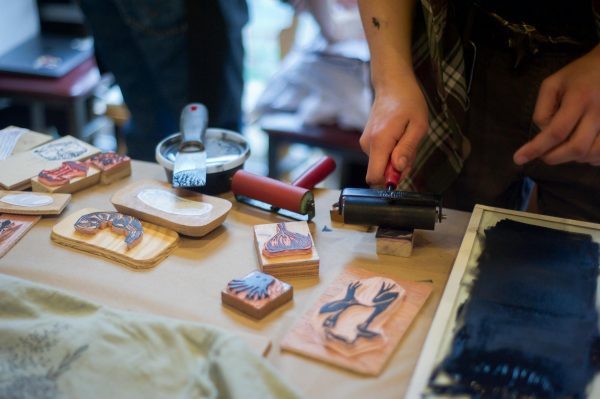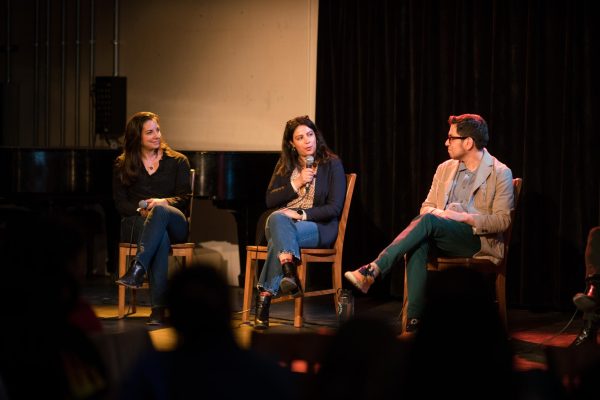Flipping Through Pages of Oberlin Student Journals
After my latest breakup, journaling gave me a reason to get up in the morning. This may come across as dramatic, and maybe it is. By the time my best friend recommended journaling, I was already tired of hearing about it. My whole TikTok ‘for you page’ was full of advice from content creators with a clean, put-together aesthetic telling me to drink green juice, do yoga, and — of course — journal. Coming from my best friend, though, it meant something.
I had plenty of empty notebooks lying around. The one I picked was a thin notebook with a gray cover that I bought on sale at my local bookshop back home. The cover featured a picture of a cat with the phrase “evil thoughts” in pink script above it. Evil thoughts seemed most accurate in describing my feelings toward my recent ex-girlfriend.
The several diaries I had kept at the age of ten when my parents started the long journey toward their divorce had prepared me for the art of journaling, but somewhere along the way, I stopped believing that my thoughts were worth writing down, no matter how mundane.
I’m tired of writing in this journal, not because I’m better but because I have so much to say, always.
Yet there is incredible value in having proof of one’s own existence. Once I started paying attention, I noticed how many people at Oberlin talked about journaling and realized that their quick scribbles in class were not jotted-down notes but journal entries. However, the more people I talked to, the more there seemed to be an idea of the correct way to journal — that the writing had to be good or in the trendy bullet-journaling form, which flooded Pinterest in 2016. The reality is that journaling is yours; it’s whatever you make it. Everyone journals differently.
“I write to process myself and to keep track of my thinking,” double-degree fourth-year Katie Galt said. “But I also use my journal as a consolidated place for grocery lists, to-dos, tracking my period, and keeping concert tickets and dried flowers and other memorable bits of paper between pages. Having a journal is like having a friend … Ideally I am being completely honest in my journal, or at least practicing doing so. There have been times when I’ve written letters to people in my journal, mostly past or present lovers, and occasionally attempts at communicating with some kind of omniscient divinity. But usually I just start a page with that day’s date and get into it.”
Nov. 12
I woke up with my period!!
Finally. It had been like 50 days. First one post-breakup. Seeing my hand covered in blood shocked me into remembering my aliveness.
Not everyone starts their journals by writing the date like Galt. Alana Florêncio-Wain, College second-year, begins her entries differently. As she’s flipping through the pages of her small, chunky notebook, I can see doodles scattered throughout pages of scribbled words in both English and Portuguese.
“[I’m writing to] me, myself, maybe future kids,” Florêncio-Wain said. “I guess I’m writing to the journal too because I start with ‘boa noite journal’ — ‘goodnight journal’ — and then I end it by talking to myself, saying ‘dorme com os anjos,’ which is ‘sleep with the angels.’ And that’s for me because my dad used to tell me that. And I like the idea of going to bed with angels.”
Boa noite Journal <3
Hoje foi um dia bom. Graças a deus porque eu precisava.
Goodnight Journal <3
Today was a good day. Thank god because I needed it.
Florêncio-Wain sees journaling less as a space to document her feelings and more as a space to create structure and recap her day. I asked her if she names people in her journal.
“Yeah, I name people,” Florêncio-Wain said. “Hello? Are you kidding me? This is me and my journal gossiping. That’s really the best part about it.”
Boa noite Journal <3
Estou assistindo Pantanal, tá ótimo! Notei que falo comigo mesma do jeitinho que fazem na novela kakaka. Mas sabe que eu não me importo porque me ajuda vocalizar os meus pensamentos e eu gosto de escutar a minha voz.
Goodnight Journal <3
I am watching Pantanal, it’s great! I noticed that I talk to myself just like how they do in the novela kakaka. But you know I don’t mind because it allows me to voice my thoughts and I like hearing my own voice.
Even within one’s journal, the audience can vary. That’s the beauty of journaling — it can take whatever shape the writer needs it to at any given moment. Emerson Holloway, OC ’22, has been journaling for a long time and has experienced the way the fluid nature of writing has catered to her needs.
“I journal about what I experience and notice in the world, paired with whatever I am feeling at that given moment,” Holloway said. “It functions as a diary, mostly, but also contains lists of things I see, places I go, songs I’m listening to, sensations I want to remember. Journaling is a practice that allows me to translate my thoughts into something tangible, which grounds me. I don’t have a particular audience in mind when I journal, … but at the end of the day I know that my reasoning for journaling is based around self-expression and self-reflection, a desire to dig so deep into myself and into the world that I can figure out what it’s all made of.”
I wish I could forgive your actions, but no amount of explanations will undo the pain, the potential for my own lost life. And I love life, being alive, and I know no one deserves to live with the pain you had to shoulder… I hope you learn how to stop confusing love and pain, care and fury. I don’t know how to remember you in any other way. The joke’s on you; my life is now defined in terms of you, my firsts of everything. My life is an epilogue.
Some people doodle, draw, or write, and sometimes journaling is grocery lists or song lyrics or poetry or an essay, or a letter. Regardless, it’s always personal. The audience could be the writer themselves, but writing, drawing, or even typing is physical documentation of individual humanity.
I’m getting all sentimental about seeing family. I guess I won’t see them until winter break, which feels like a long time! But that’s good, I guess. It’s natural to miss people.
Double-degree first-year George Rogers, who wrote the above excerpt, explains his reasoning for journaling. “I journal to have a log and record of my life,” Rogers said. “It makes me feel better about things, having a chance to process everything. What I like the most about it is how, once I fill the book up, then it’ll just be like a very complete documentation of this period of my life. I like having the ability to go back and reminisce.”








